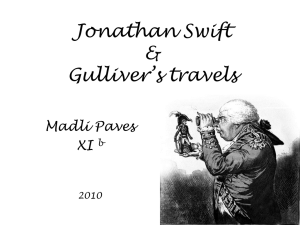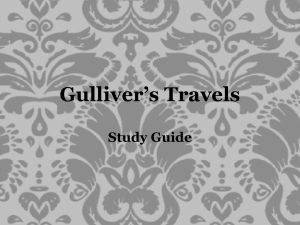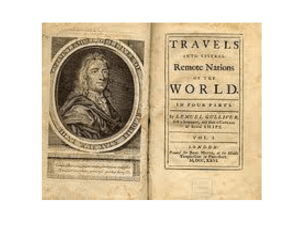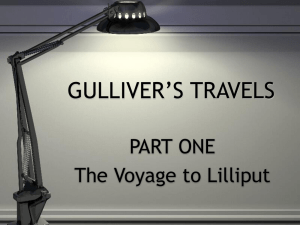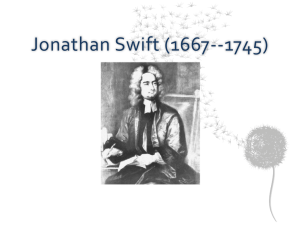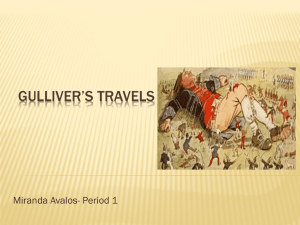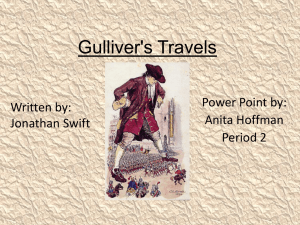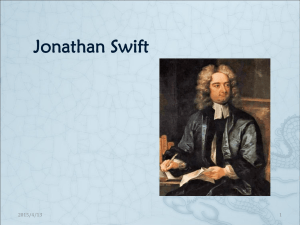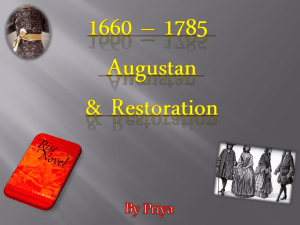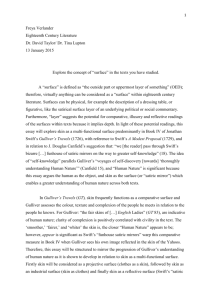Gulliver`s Travels PowerPoint
advertisement
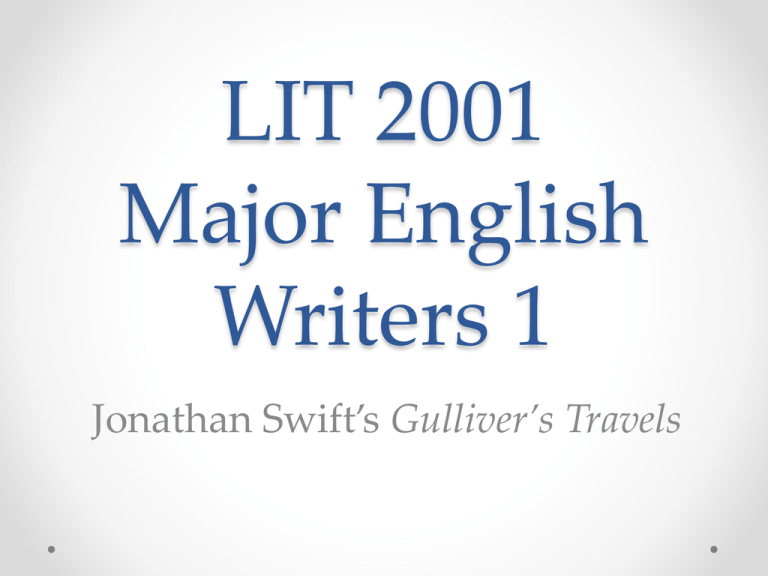
LIT 2001 Major English Writers 1 Jonathan Swift’s Gulliver’s Travels Swift’s Gulliver’s Travels, Part 1 Characteristics of the Neoclassical Age (1660-1785) --also referred to as “The Age of Reason” and “The Enlightenment,” a reaction against the enthusiasm of the Renaissance. • • • • Human beings as limited and imperfect Reverence for reason and rules (“Age of Reason”) Distrust of imagination and innovation Emphasis on groups rather than the individual Swift’s Gulliver’s Travels, Part 1 Characteristics of the Neoclassical Age (1660-1785) • Belief in Deism (the “argument from design,” God as the Divine Clockmaker) • Emphasis on symmetry, unity, harmony • Emphasis on the didactic and the satiric (satire = “a critical attitude mixed with humor and wit, generally for the purpose of improving humanity”) • Emphasis on the polite, urbane, witty, and intellectual “One truth is clear: Whatever IS, is RIGHT” (Pope’s An Essay on Man 292) Swift’s Gulliver’s Travels, Part 1 The Restoration (1660) • 1642-1648 = civil war in England, conflict between Charles I and Parliament • 1646 = Charles I was arrested, tried, and executed; Charles II goes into exile • The Puritan Oliver Cromwell became Lord Protectorate of England (England without a king) • 1660 = Charles II is restored to the crown (the restoration) Swift’s Gulliver’s Travels, Part 1 The Restoration (1660) • 1665 = The plague killed 75,000 people in London • 1666 = The Great London Fire left 100,000 people homeless • 1667 = Milton’s Paradise Lost published • 1729 = Swift’s Gulliver’s Travels published Swift’s Gulliver’s Travels, Part 1 Gulliver’s Travels: Genres • Satire = “a critical attitude mixed with humor and wit, generally for the purpose of improving humanity” • Allegory of 18th century English politics • Parody (satirical imitation) of contemporary travel literature Swift’s Gulliver’s Travels, Part 1 Gulliver’s Travels: Major Themes • Government / 18th Century English politics • War • Human Nature Swift’s Gulliver’s Travels, Part 1 Gulliver’s Travels as a Dark Look at Humanity • Parts of Gulliver’s Travels are funny; parts are dark • The original purpose to “satirize the foolishness of modern man” • Notice anything critical of human beings yet? • Gulliver seems to become a misanthrope; is Swift a misanthrope? Swift’s Gulliver’s Travels, Part 1 Passages to Discuss The Opening Letter: Pages 2489-91 • Gulliver views human beings pessimistically • Is Gulliver an idealist, or is he crazy? The Opening Letter: Page 2491 • Gulliver’s conversation with his horses • Gulliver gives up forever his “visionary schemes” Swift’s Gulliver’s Travels, Part 1 Passages to Discuss Opening of Chapter 1: Page 2492-93 • Note the different tone from in the opening letter • Note the pun Chapter 2: Page 2499 • Gulliver relieving himself • Why the emphasis on excrement? Swift’s Gulliver’s Travels, Part 1 Passages to Discuss Chapter 2: Page 2501-02 • Gulliver as representing Ireland Swift’s Gulliver’s Travels, Part 1 Satire of Politics and Politicians • The Lilliputians have a love for pomp and ceremony: note the military parades, the ceremony for swearing oaths. • Walking the tightrope • The absurd manner of swearing an oath • The High Heels and the Low Heels • The Big-Endians and the Little Endians Swift’s Gulliver’s Travels, Part 1 Satire of Politics and Politicians • • • • Bringing the Blefuscudians into submission The charges against Gulliver The proposed punishment for Gulliver* The custom of praising the emperor’s “tenderness,” leniency, and compassion after cruel punishments are handed down Swift’s Gulliver’s Travels, Part 1 Satire of Politics and Politicians • The corruption of politicians • Skyresh Bolgolam: “who was pleased, without provocation, to be [Gulliver’s] mortal enemy.” • Flimnap: Gulliver says, “This was the first time I began to conceive some imperfect idea of courts and ministers” • Rumors among politicians accuse Gulliver of having an affair with a fine lady Swift’s Gulliver’s Travels, Part 1 Does anything about the Lilliputians seem like a good idea? • False Accusers Put to Death • More rewards for good behavior than punishments for bad • Children and Parents Swift’s Gulliver’s Travels, Part 1 Satire • Reminder: satire = “a critical attitude mixed with humor and wit, generally for the purpose of improving humanity.” • Purpose of satire—to make us look critically at ourselves Swift’s Gulliver’s Travels, Part 1 The Theme of Vision or Seeing • Lilliputians see “with great exactness, but at no great distance.” • Gulliver’s protection of his eyes • Gulliver’s protection of his eyeglasses • Gulliver flees the island of Lilliput after he is threatened with the punishment of being blinded
